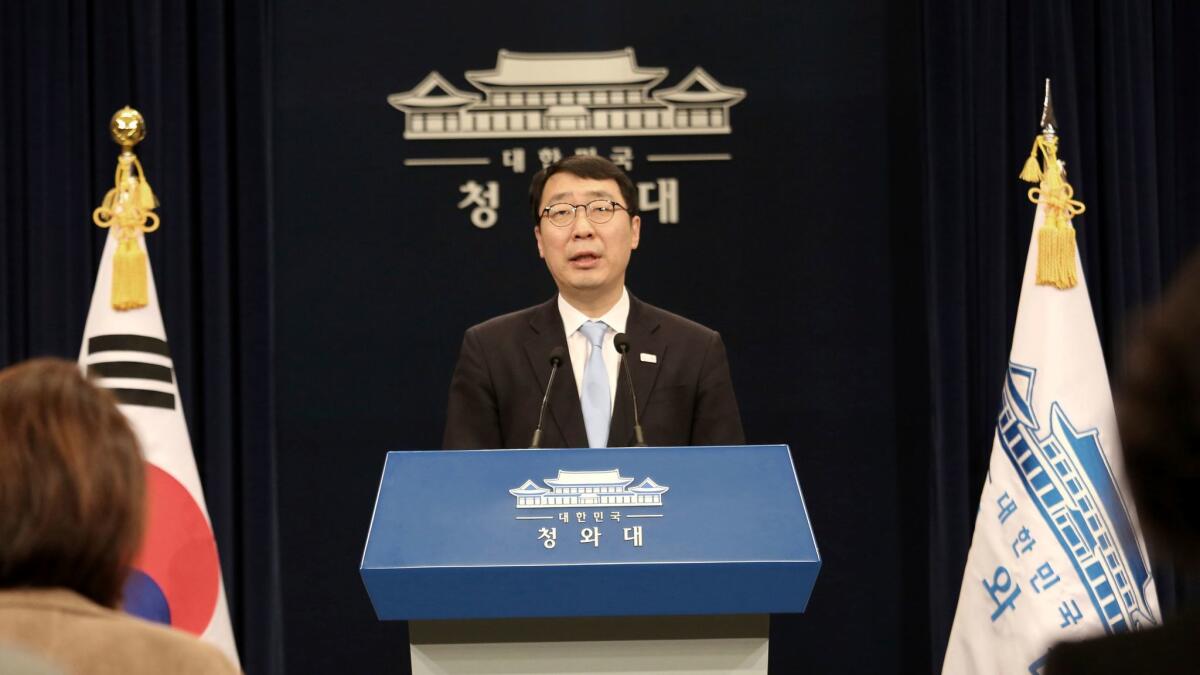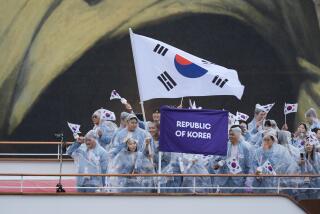Olympic glow continues as South Korea prepares to send high-level delegation to the North

- Share via
Reporting from SEOUL — South Korea plans to send a diplomatic delegation to North Korea this week, the latest effort to continue the inter-Korean dialogue made possible by the Winter Olympics.
South Korean President Moon Jae-in, who met with North Korean officials last month during the Games, will dispatch 10 aides to Pyongyang on Monday — a reciprocal move that could pave the way for a top-level, inter-Korean summit, and even talks with the United States.
The announcement, which Moon discussed Thursday in a 30-minute call with President Trump, comes as Seoul and Washington assess how best to pursue dialogue with the North while also maintaining a firm position that the totalitarian nation should curb its nuclear weapons ambitions.
The delegation “is expected to hold talks with North Korea’s high-level officials to discuss ways to establish peace on the Korean peninsula and develop the South-North Korea relationship,” said Moon’s spokesman, Yoon Young-chan.
Relations between the North and South, which are technically still at war, have turned sour in recent years as the North aggressively pursued its nuclear and ballistic missile programs — efforts that have led to widespread international condemnation and numerous economic sanctions.
The delegation also will be charged with assessing the possibility of dialogue between the North and the United States, which oversees enforcement of the cease-fire that ended brutal fighting in the Korean War. Direct, high-level talks between the two adversaries haven’t happened since the Obama administration, when Pyongyang agreed in 2012 to halt its missile and nuclear testing in exchange for economic aid.
As the Olympics opened last month, Moon met with the North’s ceremonial head of state, Kim Yong Nam. Also attending the Games was North Korean leader Kim Jong Un’s younger sister, Kim Yo Jong, who invited Moon to Pyongyang for a summit. Moon said he would consider such a high-level trip once the “conditions” were right, in part a recognition that Moon needed to sell Washington and his nation on the idea.
In recent years the North has tested dozens of ballistic missiles, including several intercontinental models capable of reaching the United States, and set off an underground nuclear explosion. Kim Jong Un declared the North a modern nuclear power in January during the speech in which he also asked for participation in the Winter Olympics.
Kim’s overture during the speech led to the North’s participation in the Games, its first since 2010. It also included a joint North-South march during the opening ceremony under a neutral unification flag. The two nations also fielded a joint women’s hockey team, the first combined Korean team in Olympic history.
The talks come at a critical moment as the nascent diplomatic spirit between the parties from the Games fades and negotiators face the tough, fundamental questions about their disagreements going forward.
“If the envoys’ trip goes well, it certainly is a win for Moon and raises hope for diplomacy to continue,” said Duyeon Kim, a visiting senior research fellow at the Korean Peninsula Future Forum in Seoul. “But the road is still delicate and tensions could escalate if the situation is mismanaged.”
A first test for any future diplomacy could come as Seoul and Washington determine when to resume their annual military exercises on the peninsula, which were delayed for the Games.
The drills, which the North sees as invasion preparations, could derail continued dialogue and the possibility for better relations between Pyongyang and Seoul, and ultimately Washington.
The South’s delegation, led by two of Moon’s top foreign policy aides, is expected to return home Tuesday and then fly to Washington to brief officials there about the discussions. The delegation also plans to continue close coordination with China and Japan, Yoon said.
Moon selected Suh Hoon, who heads the South’s state spy agency, and Chung Eui-yong, head of the national security office, as his emissaries. The two aides are thought to have strong inter-Korean experience and good relations with national security officials in Washington.
Duyeon Kim said the aides’ selection is both practical and symbolic.
“It shows that Moon is placing heavy, if not almost equal, importance on both inter-Korean relations and U.S.-North Korea relations,” she said.
The ongoing dialogue between the South and the North, which began first as a negotiation about athletes from the North competing in the Olympics, for now has the blessing of the Trump administration. Trump and his aides, who have over the last year offered differing takes on the United States’ specific strategy for North Korea, remained firm that the nuclear questions must be addressed up front.
“Any dialogue with North Korea must be conducted with the explicit and unwavering goal of complete, verifiable and irreversible denuclearization,” the White House said after the 30-minute call between Trump and Moon.
While Washington may want assurances of eventual denuclearization, Pyongyang hopes for recognition as a nuclear state — a key hurdle to any future diplomacy.
The North insisted last week that it has never agreed to dialogue with the United States under preconditions, and that it had no plans to do so now.
“We have intention to resolve issues in a diplomatic and peaceful way through dialogue and negotiation,” the North said in a statement by its Foreign Ministry through state media. “But we will neither beg for dialogue nor evade the military option claimed by the U.S.”
Stiles is a special correspondent.
UPDATES:
6:20 p.m.: This article has been updated to clarify the U.S. role, number of missiles, other details.
This article was originally posted at 4 a.m.
More to Read
Sign up for Essential California
The most important California stories and recommendations in your inbox every morning.
You may occasionally receive promotional content from the Los Angeles Times.











